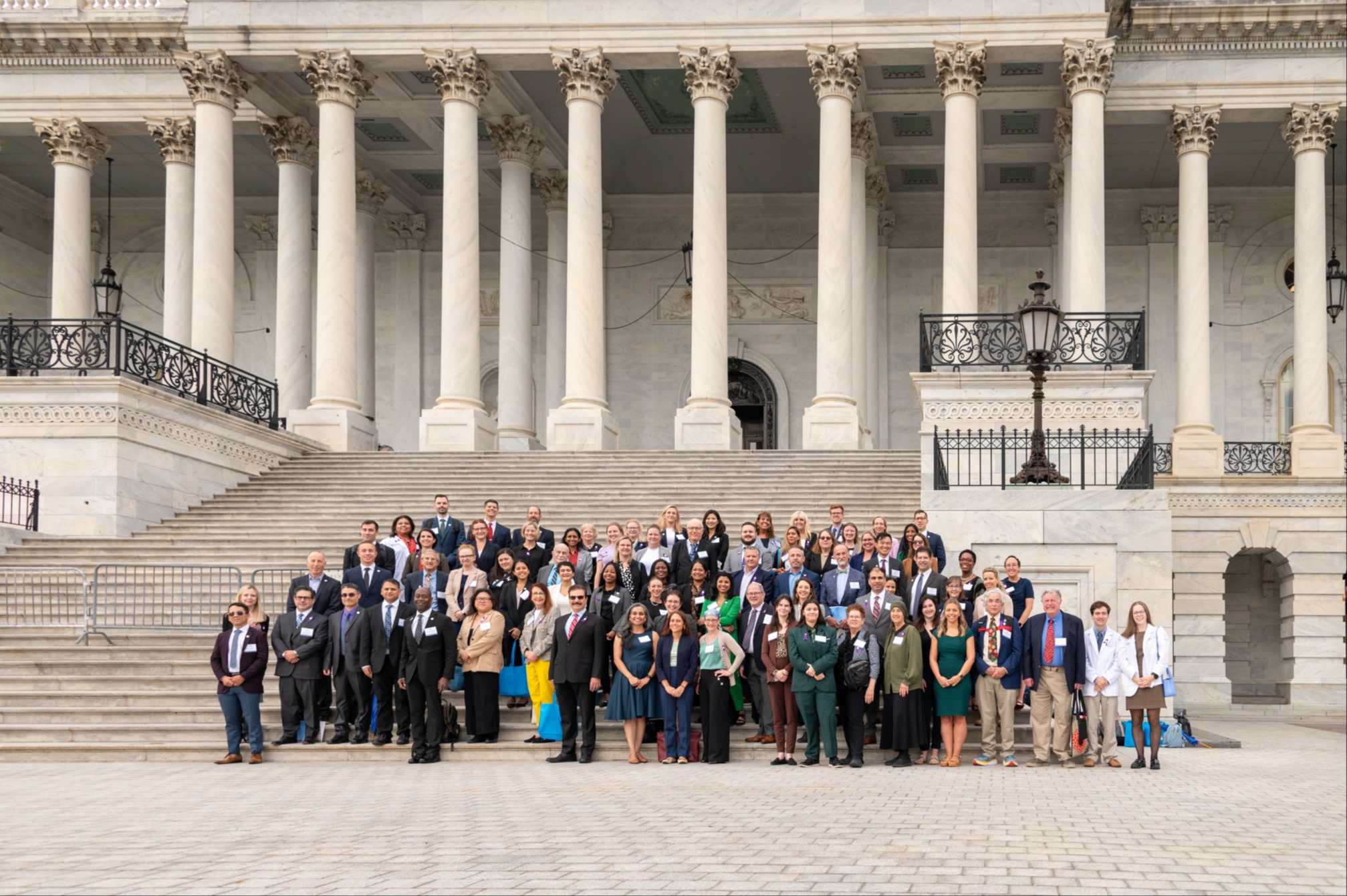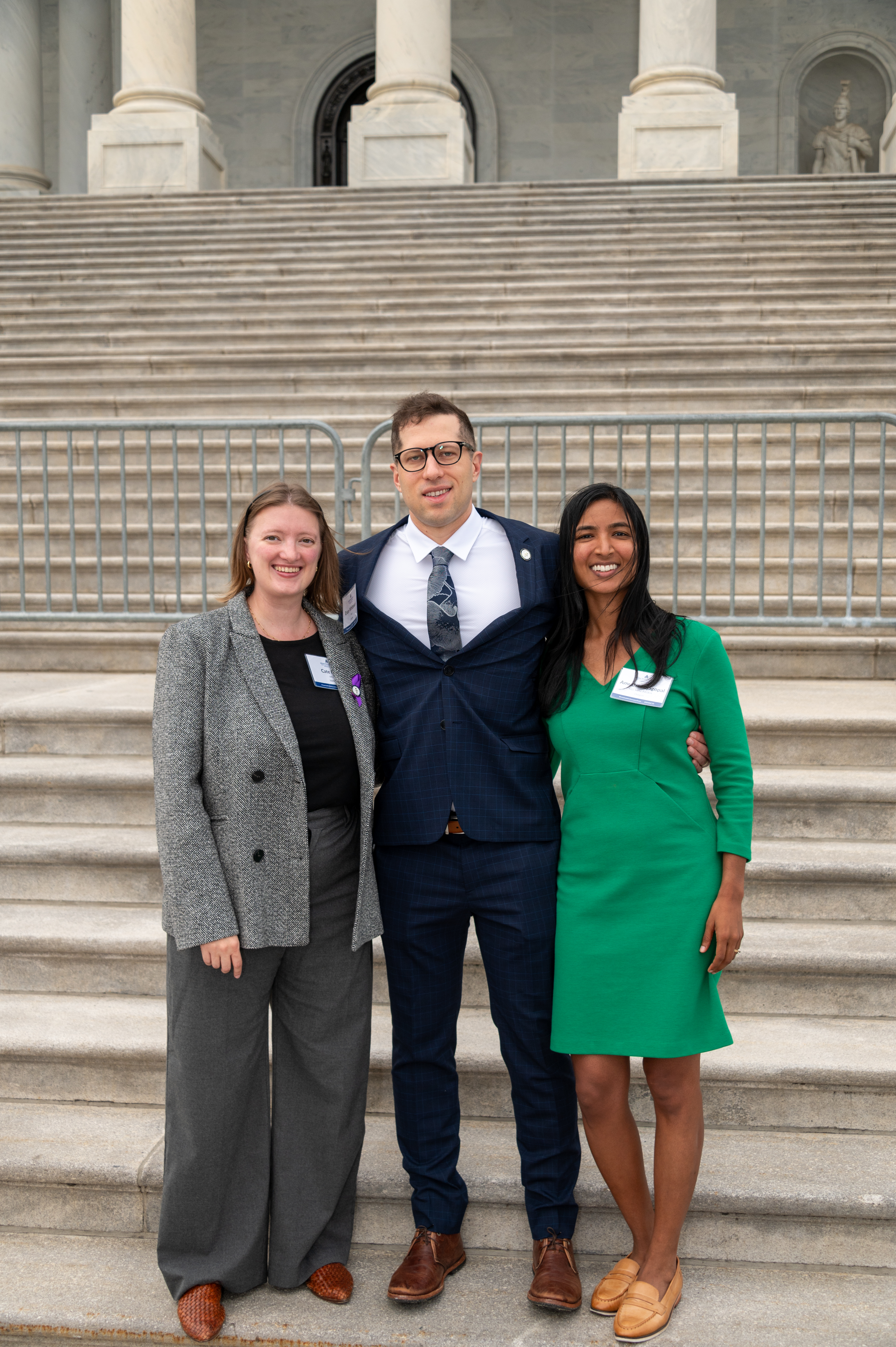Blog
Inside ASAM’s Addiction Medicine Advocacy Conference with Dr. Cate Heil
A personal calling to advocate for those affected by addiction inspired Cate Heil, MD, to travel from Idaho to attend ASAM’s Addiction Medicine Advocacy Conference (AMAC) in Washington, DC. Her goal? To use her voice and experience as an addiction medicine physician to show why Congress must act to improve access to care.
Dr. Heil currently practices family medicine and outpatient addiction medicine at a federally qualified health center in Idaho. During her addiction medicine fellowship, she spent time at a Veterans Affairs clinic and an opioid treatment program (OTP). While caring for patients across a variety of settings, she witnessed the immense challenges they faced in accessing and affording the care they needed. These experiences ultimately led her to advocacy.
Fast forward to today, and she currently serves as chair of advocacy at the Idaho Society of Addiction Medicine, where she focuses on advancing state-level policies to improve care. And as a repeat attendee of AMAC, Dr. Heil has also developed a passion for federal advocacy.

As part of the conference, Dr. Heil joined nearly 100 fellow ASAM members from 35 states to meet with lawmakers and their staff. Together, attendees advocated for two key bills that aim to expand access to addiction care:
The Modernizing Opioid Treatment Access Act (MOTAA), which would allow board-certified addiction medicine physicians and psychiatrists to prescribe methadone for the treatment of opioid use disorder (OUD) that a patient could pick up at a community pharmacy.
The Residential Recovery for Seniors Act (RRSA), which would create a Medicare Part A benefit for residential addiction treatment programs meeting nationally recognized standards, categorized as Level 3.1: Clinically Managed Low-intensity Residential Treatment; Level 3.5: Clinically Managed High-intensity Residential Treatment, and/or Level 3.7: Medically Managed Residential Treatment.
In this conversation, Dr. Heil takes us behind the scenes of AMAC, reflects on her meetings with federal lawmakers and staff, and shares the eye-opening lessons from her time in DC.
What inspired you to make the journey from Idaho to DC to advocate for patients?
I think it's the right thing to do, and that's kind of what it comes down to. I'm a fairly quiet and reserved person, but I seem to be driven by wanting to do what I think is right. I think that comes from my religious beliefs, so seeking justice, loving mercy, is something that I think about, as well as using my voice or the small amount of power that I have as a physician to help my patients who may not be able to advocate for themselves or may not be listened to.
You had a packed day of meetings on Capitol Hill, including with your own US Senators. Walk us through your busy day advocating.
First, we had our picture taken at the Capitol. Afterwards, we split up to attend our respective meetings. Our team, which represented Idaho and Oregon, didn’t have meetings until around 11 AM, so we spent some time exploring the nearby Library of Congress, and it was fun to do some touristy things before getting started. And then we hit the ground running.
Due to the limited time available in these meetings, we wanted to ensure that offices understood we came to discuss two bills. I found that all the offices were very professional, and the amount of knowledge that they had on these bills varied. A couple of the staff knew a lot about the legislation and had several good questions to ask.
.png?sfvrsn=d1daf79_1)
Was education a big part of your meetings?
I think so, especially with explaining why something is important, like methadone treatment for OUD. The advocacy part is talking about how we want to give our patients easier access to methadone for OUD, but the why is the educational part. We’re explaining that this is a gap in the treatment choices that we're able to offer our patients, and this is why it's important.
One bill advocated for was the Residential Recovery for Seniors Act, which would provide Medicare coverage for residential addiction treatment programs meeting nationally recognized standards. From your perspective, how would this be a win for patients and the addiction medicine field?
The trends we have seen in older adults are that they’re living longer, healthier lives, and so they're taking some of those diseases and substance use disorders of early adulthood, and they're taking them into older adulthood. Older adults are also particularly susceptible to things like chronic pain diagnoses, and I have seen patients get mixed up in fentanyl because they thought that they were buying legitimate pills on the Internet. And so here they are with a substance use disorder when they're older. The demographics have changed, and our legislation needs to catch up with that.
I think that it's important to offer patients different choices. It’s difficult to see a patient who maybe wants to go to a residential treatment program, and you think that outpatient isn't working for them, maybe it would be good for them to get out of their bad situation and into a safe place, and you're not even able to really offer that to them because they can’t afford it. I think it's good to be able to offer patients all the choices that they can have, and then they can make a decision. And right now, that’s not really possible
Were offices surprised to learn about this dangerous Medicare coverage gap for residential addiction treatment?
I think that they were surprised. And I think another thing that's important to think about is that Medicare is mostly for the elderly, but there are other people with Medicare who are younger than 65, so this bill would apply to them, too. If they're disabled, they're either medically or psychiatrically complex, and so they should be able to access this treatment as well.
The other thing is, from what I understand, different residential treatment programs can offer different things. Some may not offer medications, some may offer medications, some are religious, and so on. But if you were going to accept Medicare funding, you would need to meet certain criteria, and so my hope is that it would standardize the experience more.
The other ‘ask’ was to pass the Modernizing Opioid Treatment Access Act (MOTAA), which would permit board-certified addiction specialist physicians to prescribe methadone for OUD treatment that a patient could pick up from a community pharmacy. If passed, how do you see this impacting the treatment landscape?
I think that the impact on patients would be that they would get a choice. I described this to lawmakers by likening it to something that we all can understand, which is pneumonia. I can treat patients with pneumonia in the office with antibiotics. There's a bunch of different antibiotics, inhalers, and maybe oxygen. But if I believe someone is very sick, I escalate their level of care. Once they get to the ER, they do different things that I can't do in the outpatient setting, like X-rays, scans, and more medications.
With MOTAA, I likened it to the fact that we have a bunch of different antibiotics, some of them are really old but still really effective, and it would basically be saying that I can't use this one antibiotic for you just because of outdated rules for it. I just can't do it, sorry, I can’t offer it to you.
When I talk to patients about treatment for OUD, you do informed consent and give them all the options, which would be either nothing, counseling, or medications, which are buprenorphine, naltrexone, and methadone. But I can't give you methadone, you have to actually go somewhere else. So after I've learned all of this stuff about your life and what your goals are and things like that, if we talk about methadone, you have to kind of start that process over again.
If we had that available in the office, I think it would be helpful because someone within their primary care office or psychiatry office could have a designated, board-certified addiction medicine physician or addiction psychiatrist to prescribe methadone for OUD and see these patients, keeping care all in one place.
Also, methadone doesn't show up on the prescription drug monitoring program (PDMP), which is a big safety issue in my opinion. I also think that the rise of fentanyl seems to make methadone a little bit more relevant than it was previously.
Physicians like you are incredibly busy. It takes a significant amount of time, effort, and planning to temporarily step away from the clinic and travel to DC to advocate for these issues. But it’s important. In what ways did you feel like your voice as a physician resonated with offices?
When a Hill office thought it was nonsense that we couldn't prescribe methadone for OUD, I think that the assumption was, ‘Well, you're a doctor, you should be able to do that, and you're telling me that you can't. That doesn't seem right, I will listen to you,’ type of thing. All the offices asked questions about how this bill would affect me or my patients.
They also asked a lot of logistical questions, which was cool to see that they were actually asking about that rather than just listening to my opinion. Instead, they’re thinking about how to make this happen.

What was eye-opening about your time advocating with ASAM?
I tend to be a work-within-the-system type of person, so I don't always think of things outside the box. This has been a good experience for me to see how things can be better.
For example, before doing this, if I had known that Medicare doesn't cover residential treatment, I probably would have thought, ‘Well, okay, I'll find something else. I'll work within the system.’
However, this shows me that people have ideas about things that can be changed and improved, and perhaps we can make it happen or make it just a little bit better for patients. It's been good for me to learn that and maybe identify some other areas that could be helpful.
In one word, how would you summarize your time in DC?
Worth it (I know that’s two!)
You can help as we continue to advocate for the Residential Recovery for Seniors Act and the Modernizing Opioid Treatment Access Act. It takes five minutes to send a letter to your members of Congress here.
And stay up to date with the latest addiction medicine policy news from ASAM by signing up for our monthly newsletter, The ASAM Advocate.
